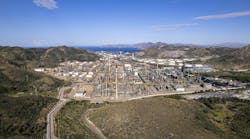Eric Watkins
Senior Correspondent
Doris Leblond
OGJ Correspondent
PARIS, June 23 -- French authorities, aiming to bypass striking port workers in France, have begun using the Societe du Pipeline Sud Europeen (SPSE) pipeline to transport oil from a strategic storage facility at Manosque to the Fos-Lavera oil port near Marseille.
The SPSE pipeline's normal supplies have been disrupted by a series of 1-day strikes by port workers (OGJ Online, June 13, 2008). Up to now, refiners have been using existing stocks, but new supplies are needed.
Four refineries are in the Fos-Lavera hub, and pipelines running from Fos supply a number of other French and European refineries with crude oil, including the 300,000-b/d Miro refinery in Karlsruhe, Germany.
Port workers have been striking to protest government plans to privatize certain activities at France's ports.
"Rolling strikes over the last 3 months have had a very important impact on all refineries," said Jean-Louis Schilansky, president of the oil companies' trade group Union Française des Industries Petrolieres, alluding to the problem for the first time before a group of journalists. "The strikes at the Marseille ports are considerably perturbing us."
The oil industry had chosen to keep a low profile on the matter which, they said, was one that solely concerned the trade unions and the government, i.e., the full privatization of loading activities at all France's ports to bolster their competitively.
The port of Fos, the third largest petroleum port worldwide, has been caught in the stop-and-go strikes over the past 3 months. The strikes "de-optimized the refining industry as well as the ships, which cannot unload or load on a regular basis," said Schilansky.
Venturing that the loss for industry could be hovering around €15 million, he noted that this was "a new kind of strike," not like any other clear-cut strike where the consequences can be measured in hard terms. The rolling strike is "sapping France's refining system, well beyond the Marseille-Fos area," said Schilansky.
The meeting with a few journalists was held to explain the price mechanisms for oil products and the impact current soaring oil prices have on them. Noting that France's domestic tax on oil products, which favors diesel oil over unleaded, has been instrumental in favoring the purchase of diesel-fueled cars, Schilansky pointed out that strong demand in a context of soaring oil prices had compensated the diesel oil-gasoline differential. Diesel car owners are now at a disadvantage. In the long run this could change the diesel oil-gasoline refinery balance.
Strong diesel oil demand has pushed up gross refinery margins, which now are at €30-32/tonne, the break-even point being €20.63/tonne. However, Schilansky said the gross transport distribution margins in France are among the lowest in Europe, and "the erosion should continue," he said.
He also pointed to the "crucial role of the euro" in reducing the oil price impact on French consumers, noting that high prices had not yet affected oil demand in France.
Contact Eric Watkins at [email protected].

